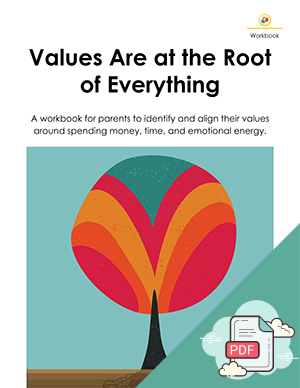What are family values? Do they differ from other values? Are they important? Do you need them? Can they change? Most parents trying to raise thoughtful and responsible kids find themselves asking these kinds of questions more often than you might think.
Most of us believe we are clear on our values and generally live our lives accordingly. But then we get married and perhaps have children. Suddenly, we’re tested in all kinds of ways, making some small and some very large decisions that affect our partners and our kids. It’s then that we realize our priorities might have to change.
For some, that comes easily. For others, it can be a difficult evolution. At Raising Families, we talk about values and family values a lot. We want to make sure you’re clear on what exactly family values are and why they’re important.
Personal Values Help You Make Decisions
Personal values are the characteristics or habits that motivate us to make a particular decision or act one way or another. Whether we consciously think about it or not, we all have our own values that guide the decisions we make and how we live day-to-day.
Our values provide the foundation for nearly all decisions we make as individuals and as parents. They determine our priorities and often are the measure by which we decide if we are living our best life. That’s why it matters that we become familiar with our true values and figure out if those are family values we want to pass on to our children.
What Are Family Values?
Family values are the values you and your partner intentionally or unintentionally use to guide your family. These are most likely a combination of your and your partner’s personal values. And yes, they can absolutely change over time as your children mature and you both gain wisdom and insight as parents.
Even if you haven’t had a discussion with your partner or as a family about the values you believe are important for your family, you’ve been basing the family decisions on your family values. These can include decisions about what you do together, where you live, and how you spend the family money.
Here are some examples of both personal and/or family values:
- Love and respect for others
- Honesty and openness
- Patience or tolerance
- Forgiveness
- The importance of hard work
- Flexibility
- Wanting to learn
- Spirituality
- Importance of education
- Personal accountability
Personal and Family Values Aren’t Always the Same
Your family values will most likely overlap with your personal ones, but they can include different ones as well. Personal values at work may not be appropriate to the family setting. Maybe you value being right and having the last word in your business environment, but you may soon find that children play by different rules than employees.
Do you value having quiet and obedient children? Or do you want them to feel seen and heard and be intrinsically motivated to contribute to the family team? You may want to revise your priority of being right and instead prioritize connection before correction.
That may look like you doing the internal work to stop yelling at your children for minor mistakes (valuing control and being right) and instead finding a way to take a breath and work on problem-solving together (valuing your relationship more than rule following).
Maybe you’re fine (prefer even) eating lunch by yourself and scrolling social media every day at work. At home, however, you feel strongly that eating together as a family each night is an important tradition. It makes you feel like a good parent, so you make a commitment to share that time, free of cell phones and other distractions.
Understanding our personal values raises our level of self-awareness and helps us to be more thoughtful and intentional with our children and partners. Ultimately that makes for happier, more cooperative, and higher functioning families.
How Family Influences Your Values
Values will be different for everyone. Your personal and family values are based on things that you’ve been exposed to and that influence you. You can get your values from your parents, your beliefs, the media, or the experiences you’ve had, to name a few.
Your family can be one of the most influential things when it comes to developing your own values, which is one of the reasons it’s so important to be intentional with your family values. Even without meaning to, you are passing on your values to your children in an unconscious way through everyday interactions, simple conversations, and how you use your resources like time, money, and attention. This can create a problem if your children often spend time with extended family and their values don’t align with your family values.
Why Family Values Are Important
Whether you’ve intentionally thought about your family values or not, you have them. If you don’t intentionally decide on what your family values are, you end up making decisions that ultimately impact your entire family based on things that may not be important to you or your family.
Another way of saying it is your family values represent what your family judges to be important in life. If your family believes something is important, you’ll spend time and money to acquire it. If not, your family won’t care as much about having it.
Your finances, time, and emotional stamina can be invested in any number of ways. The key to living an intentional and fulfilled life is to align those investments with your family values.
One of the keys to a prosperous and harmonious family life is aligning those values with those of your partner. If you aren’t sure what your values are or whether or not they’re aligned with your partner’s, take a look at your actions. Your actions reflect what you value. Are your actions consistent with what you believe your values are? If not, how can you change your actions to show what you do value?
If you know that your actions, the results of your decisions, are rooted in your values, then it only follows that what you experience in life is directly related to those values.
Just because you say you value something doesn’t mean your actions support it. With new awareness, however, you have the power to make changes in the right direction.
It is paramount that you talk as a family team about your values, why you make the decisions you do, what’s most important to you, and whether your values are really in sync with your behaviors. Remember, values are the root of everything.
Workbook
Values Are At the Root of Everything
A workbook for parents to identify and align their family values around money, time, and emotional resources.
- Designed for parents to do together
- 16 page PDF workbook
- Includes four simple exercises to do together
What To Do Next
1. Read more in the blog:
The Family Wisdom Blog shares valuable ideas across diverse topics.
2. Explore the Printables Library:
Our printables library is filled with must-have activity ideas, checklists, guides, and workbooks.
3. Subscribe to Our Newsletter:
Sign up for our newsletter for parenting tips to help you create the family team you've always wanted.
Rick Stephens
Rick Stephens is a co-founder of Raising Families. With 33 years of experience as a top-level executive at The Boeing Company and having raised four children of his own, he is able to support parents and grandparents by incorporating his knowledge of business, leadership, and complex systems into the family setting.
In his free time Rick enjoys road biking, scuba diving, visiting his grandkids, and generally trying to figure out which time zone he’s in this week. Read full bio >>






